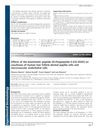November 2019 in “SLAS technology” New findings suggest certain genes and microRNAs are crucial for wound healing, and innovative technologies like smart bandages and apps show promise in improving treatment.
13 citations,
September 2022 in “Frontiers in immunology” Ifidancitinib, a JAK inhibitor, effectively regrows hair in mice with alopecia by tiring out harmful T cells.
 10 citations,
August 2022 in “International Journal of Molecular Sciences”
10 citations,
August 2022 in “International Journal of Molecular Sciences” Leptin-deficient mice, used as a model for Type 2 Diabetes, have delayed wound healing due to impaired contraction and other dysfunctional cellular responses.
7 citations,
January 2019 in “Journal of clinical medicine research” Menopause causes significant changes in the vaginal introitus, but less so in the labia majora, which may lead to symptoms of vaginal atrophy.
 6 citations,
May 2020 in “Nutrients”
6 citations,
May 2020 in “Nutrients” Eating fewer calories may slow skin aging and improve skin health through various biological changes.
 2 citations,
July 2022 in “Frontiers in Cardiovascular Medicine”
2 citations,
July 2022 in “Frontiers in Cardiovascular Medicine” Forsythiasides have multiple health benefits but may cause pseudoallergic reactions, and more research is needed.

Plant-based compounds can improve wound dressings and skin medication delivery.
March 2017 in “Current dermatology reports” Topical JAK inhibitors can effectively treat alopecia areata and vitiligo by modulating immune responses.
 January 2017 in “Indian journal of drugs in dermatology”
January 2017 in “Indian journal of drugs in dermatology” Saw palmetto extract may help with hair loss and acne but needs more research on safety and long-term effects.
January 2022 in “Stem cell biology and regenerative medicine” Lymphatic vessels help hair follicles regenerate by interacting with stem cells.
22 citations,
September 2019 in “Trends in Immunology” Acne is a temporary skin imbalance during puberty that often resolves on its own.
 2 citations,
October 2022 in “The journal of investigative dermatology/Journal of investigative dermatology”
2 citations,
October 2022 in “The journal of investigative dermatology/Journal of investigative dermatology” AIRE deficiency causes hair loss similar to alopecia areata in mice.
 82 citations,
June 2020 in “Inflammation Research”
82 citations,
June 2020 in “Inflammation Research” Skin problems in COVID-19 patients are rare and may be due to the body's complex immune response or blood clotting issues.
 14 citations,
March 2022 in “Journal of inflammation research”
14 citations,
March 2022 in “Journal of inflammation research” Baricitinib shows promise as a new treatment for certain skin conditions like alopecia areata.
 January 2024 in “Inflammation and regeneration”
January 2024 in “Inflammation and regeneration” Th22 cells are essential for Tβ15-induced hair growth in mice.
5 citations,
July 2020 in “Recent patents on inflammation & allergy drug discovery” Childhood Alopecia Areata causes hair loss and requires varied treatments, with psychological support being crucial.
 17 citations,
February 2019 in “PubMed”
17 citations,
February 2019 in “PubMed” Stem cells can help regenerate hair follicles.
 April 2017 in “The journal of investigative dermatology/Journal of investigative dermatology”
April 2017 in “The journal of investigative dermatology/Journal of investigative dermatology” Stress in hair follicle cells increases certain immune-related proteins, which might contribute to hair loss conditions.
 7 citations,
December 2015 in “Experimental Dermatology”
7 citations,
December 2015 in “Experimental Dermatology” Sh-Polypeptide 9 may be better than minoxidil for hair growth and protection against damage.
 130 citations,
August 2015 in “Experimental Dermatology”
130 citations,
August 2015 in “Experimental Dermatology” Human hair follicle organ culture is a useful model for hair research with potential for studying hair biology and testing treatments.
 115 citations,
September 2000 in “The Lancet”
115 citations,
September 2000 in “The Lancet” Early hair loss may indicate risk of insulin resistance.
 80 citations,
January 1995 in “The American Journal of Medicine”
80 citations,
January 1995 in “The American Journal of Medicine” Hair loss in androgenetic alopecia is caused by genetic factors and androgen excess, and can be treated with combined therapies.
 42 citations,
February 2021 in “Signal Transduction and Targeted Therapy”
42 citations,
February 2021 in “Signal Transduction and Targeted Therapy” Hair follicle regeneration possible, more research needed.
 38 citations,
June 2019 in “International Journal of Molecular Sciences”
38 citations,
June 2019 in “International Journal of Molecular Sciences” Tiny particles called extracellular vesicles could help with skin healing and hair growth, but more research is needed.
 1 citations,
January 2013 in “Journal of Investigative Dermatology”
1 citations,
January 2013 in “Journal of Investigative Dermatology” The document concludes that stem cells and their environments are crucial for skin and hair health and have potential for medical treatments.
 December 2023 in “Research Square (Research Square)”
December 2023 in “Research Square (Research Square)” People with Down syndrome have higher rates of certain immune-related conditions and need special medical attention.
 759 citations,
February 2009 in “Current Biology”
759 citations,
February 2009 in “Current Biology” Hair follicles are complex, dynamic mini-organs that help us understand cell growth, death, migration, and differentiation, as well as tissue regeneration and tumor biology.
 421 citations,
April 2012 in “The New England Journal of Medicine”
421 citations,
April 2012 in “The New England Journal of Medicine” Alopecia Areata is an autoimmune condition causing hair loss with no cure and treatments that often don't work well.
 218 citations,
January 2013 in “The Lancet Oncology”
218 citations,
January 2013 in “The Lancet Oncology” Chemotherapy causes hair loss by damaging hair follicles and stem cells, with more research needed for prevention and treatment.
 134 citations,
January 2011 in “Development”
134 citations,
January 2011 in “Development” Adam10 enzyme is crucial for healthy skin and proper Notch signaling.






















